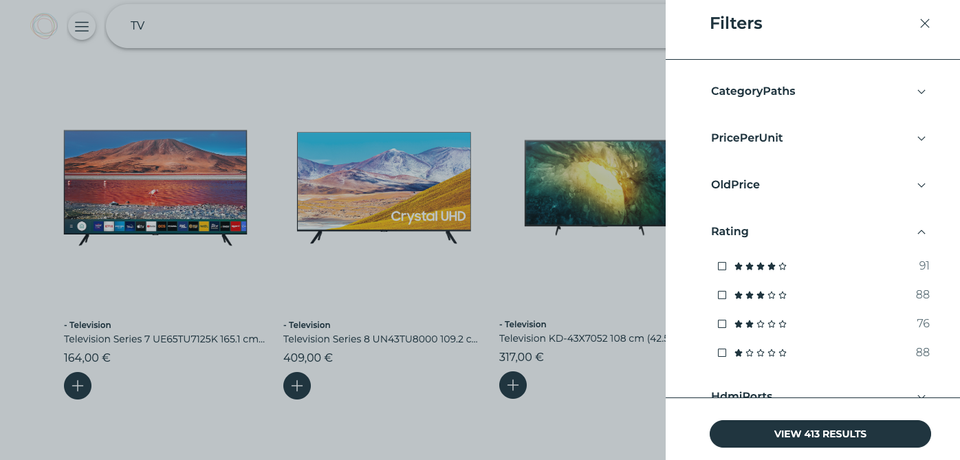APIs for Search Experience Experiments
Categories
Consider the Basics
To create a memorable search experience for a certain set of products, one of the most important elements is the data to be shown. The information that shoppers receive regarding the different products available greatly impacts their decision whether or not to make a purchase.
Of course, the information provided about a product may not always be complete. But, there are some minimum requirements that must be met so we can get the most out of the product catalog:
- Title and Description: The shopper needs to know what they are looking at, and we need words to help them find the correct products. This information fulfils both aims.
- Image: Not just any image, but one that highlights all the interesting parts of the product to capture shoppers’ attention and draw a distinction between other items.
- Price: All elements in a catalog must have their price displayed, along with any applicable discount. This information should be shown on the product card and can also be used as a filter.
- Category: Like price, all elements should belong to a category. This is a very common filter in search experiences, so shoppers expect to see the categories that help them explore the catalog.
- Filterable Data: Filters help reduce the size of the catalog when shoppers are in search of a product with a specific element. To create them, the products need to have filterable data that allows them to be differentiated by characteristics, such as color, size, or brands.
Of course there are other elements that could enrich the shopper’s experience, such as product rating data or images of the available colors (to create a visual filter). Nonetheless, there is a way to create a mesmerising experience with just the basics. Don't underestimate the power of a good description!
Just Add Data…
When we create a new search experience here at Empathy, the shop already has all this data and we don’t need to think about how to get the product information. Yet, if we want to create a personal project to practice or simply want to take on a challenge, appropriate product data is a necessity.
A few months ago, I found myself in exactly that situation and one of my first ideas to obtain data was using a public API. However, not all the public APIs fulfill the indispensable requirements and I didn’t want to use the Harry Potter or Star Wars APIs that everyone seems to use in their personal projects. So, I decided to research less mainstream alternatives and found a bunch of options with no authkey required.
What better for a practice store than data from a real store? If “real” means virtual, of course… This API provides information about a lot of items from the videogame Valorant, including categories, prices, images, and a lot of fields for creating filters! It deserves a 10/10 rating.
This API contains a set of makeup products with categories, prices, images, and other information. It’s a good example of a set of data that fulfills all of the necessary requirements. However, it has a limited range of product types, which is why I give it a 9/10 score.
The next alternative API allows developers to use data from PC games on their own projects. Even though it doesn’t show a lot of information about the games, it is much more complete when combined with the “Deals” data. But, due to the fact that there is no explicit category field, it only gets a 7/10 rating.
In addition to a lot of information about books and authors, this API even has a search engine incorporated (which is great if you are looking to create just a frontend search experience). The only drawback is the lack of prices for the books, but it does contain identifiers from stores like Amazon, so it is possible to obtain that information! That said, it gets an 8/10.
Based on information about anime and manga, this API provides images of the characters, voice actors, staff and the anime or manga itself. It also provides extra information about the topics that can be used in filters. Although this resource does not have prices for the products, it can be easily remedied by replacing the ranking of the anime or manga, or can be generated by a common random generator in code. All in all, I give it an 8/10.
This unofficial API has information about songs, singers, and lyrics. It doesn’t have a price or category field, but another field like song duration could be used instead. The downside is that it must be used in a local environment, which drops it to a 6/10 rating.
This database has lots of information on video games but, unfortunately, does not feature price or category data. It is still a decent option and earns a 7/10 score.
Start Building!
With all of the interesting API options laid out above, there are plenty of reliable data sources at your disposal. I already did the research and I don’t like wasting time (even if it’s not mine), so I hope those alternatives save you a step!
Using any of the APIs listed above, you can easily create your personal search experience. Don’t hesitate – get experimenting with the different catalogs and start building your projects!
